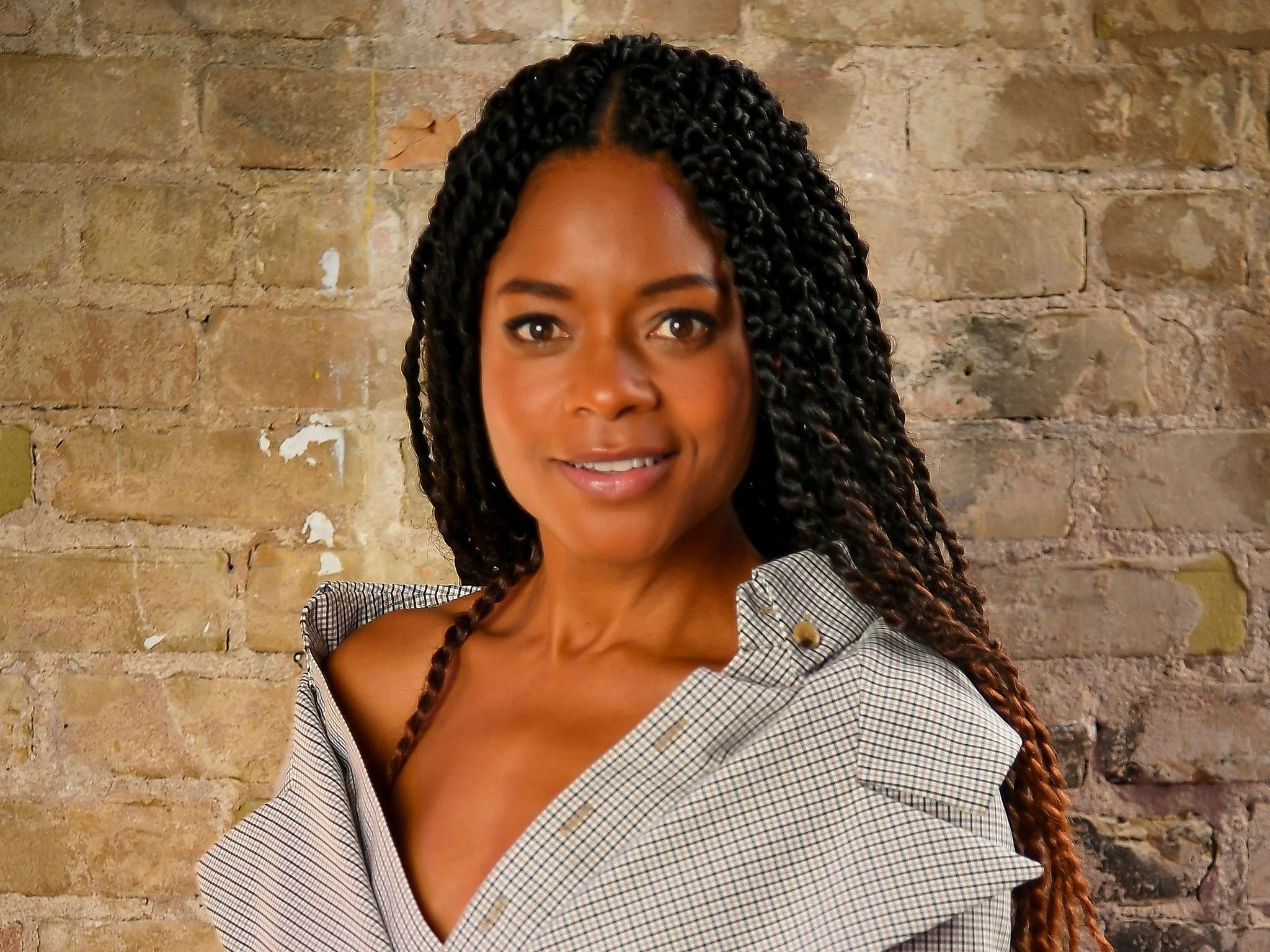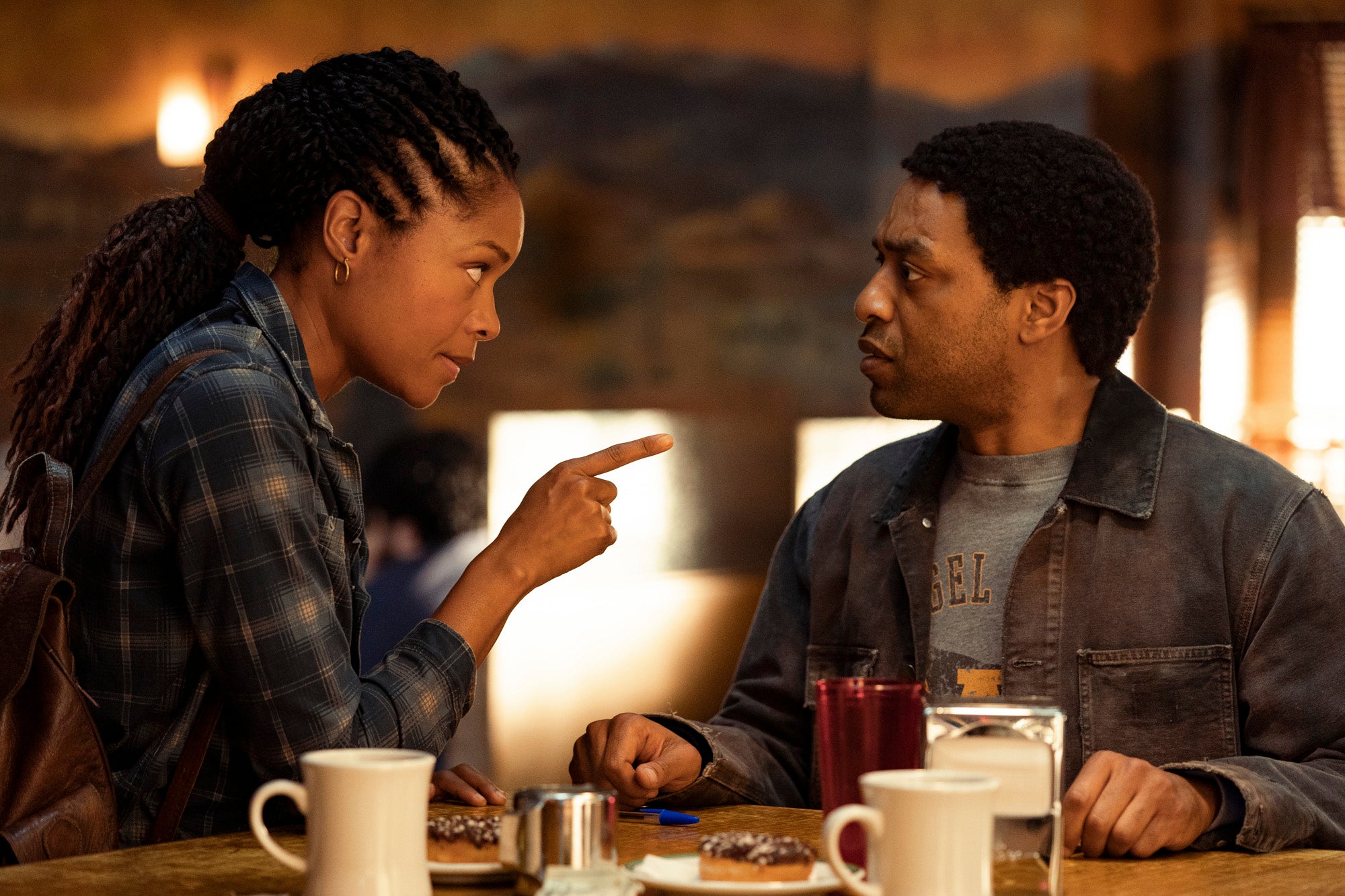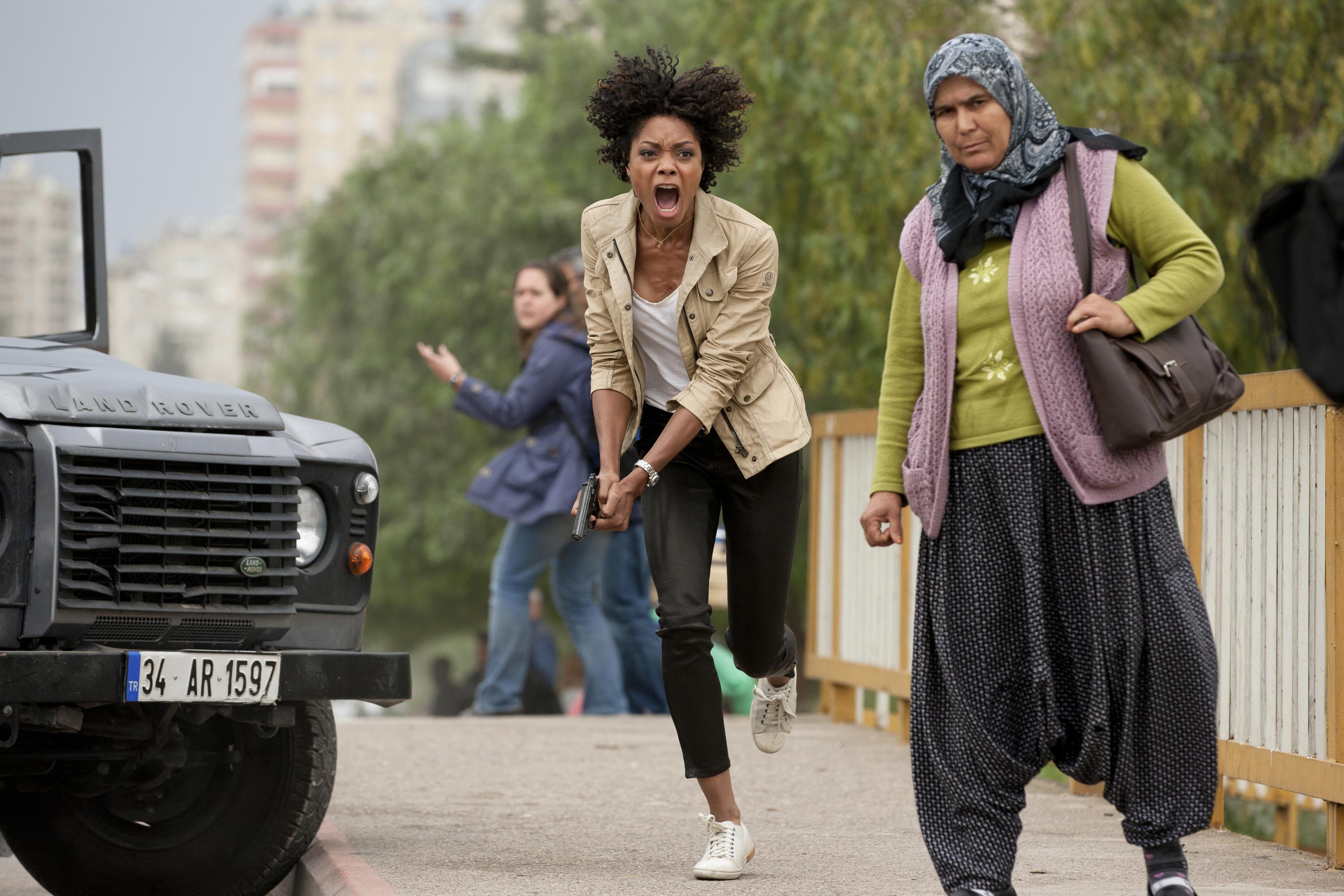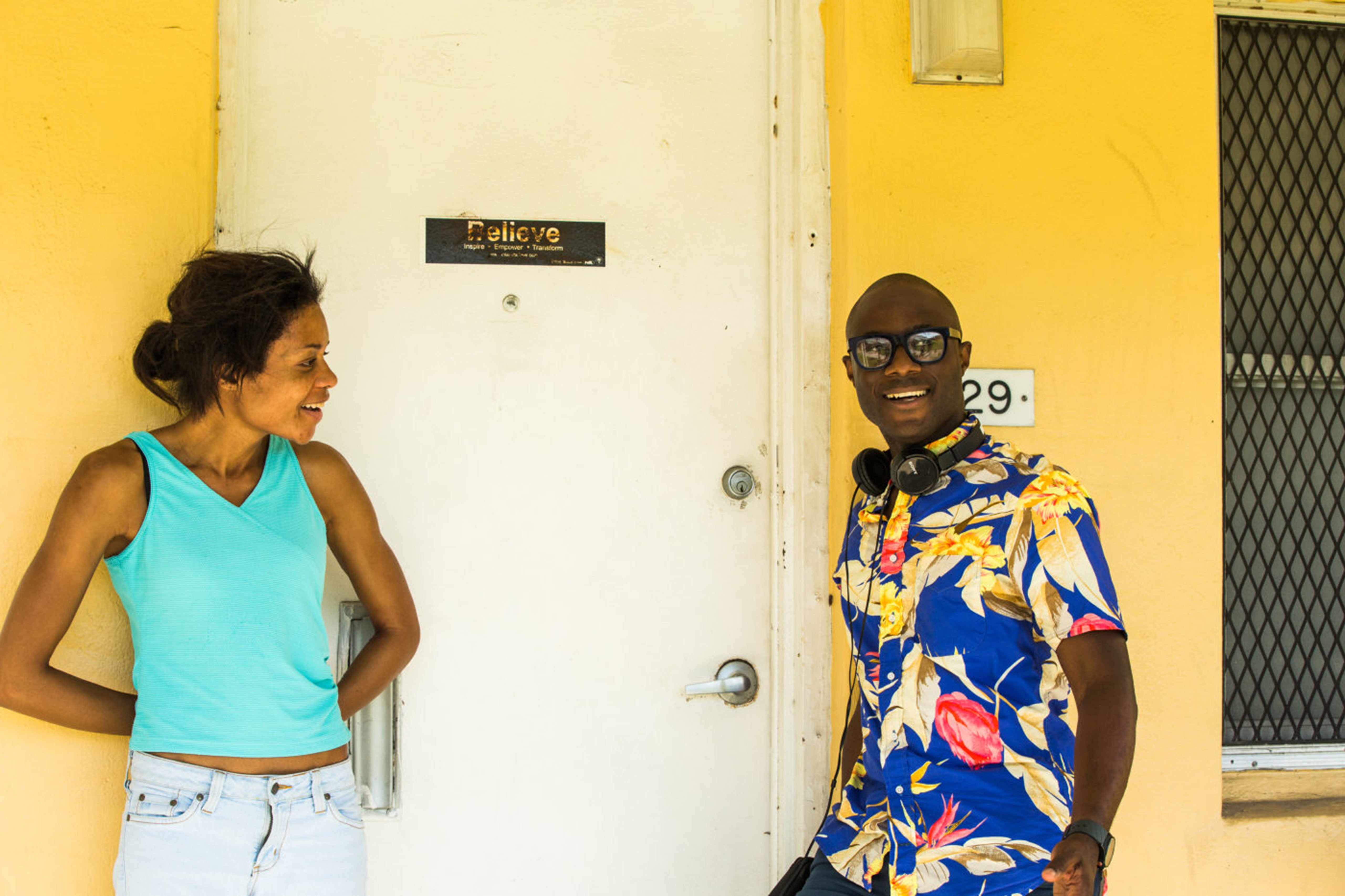Naomie Harris: ‘The Depp vs Heard trial was rammed down our throats’
The Oscar-nominated star of ‘Moonlight’ and the Moneypenny of the modern Bond era tells Ellie Harrison about her fears around guns on set, why the MeToo movement is irreversible and her new show ‘The Man Who Fell to Earth’


A few years ago, Naomie Harris found herself in the most unlikely of places: an anger management class. Sitting across from me today in a London hotel room, delicately sipping a peppermint tea, Harris is so sweet and gentle that she makes Matilda’s Miss Honey seem brutish – but she explains that she went willingly. “One of the things I really struggle with is anger,” she says. “I went on the course to learn how to express it and get in touch with it. But it was just full of very angry people who couldn’t contain it.” She laughs. “I think I was on the wrong course.”
Acting is a “licence to be angry”, Harris says. “All emotions are beautiful and have their place, and they shouldn’t be suppressed, right?” she continues. “But what I fear about anger is that it seems very targeted at particular people. It’s very destructive and it can be painful to experience it, which is why I bottle mine up. It’s so wonderful to have the opportunity to let loose on screen. You can just go for it.” What does she do in real life if, say, someone cuts her off in traffic? “I just smile sweetly,” she says, flashing her teeth.
When Harris got her first big break, as plague survivor Selena in the eerily prescient 2002 pandemic horror 28 Days Later, director Danny Boyle told her to “drop the Princess Anne accent”. She was fresh out of Cambridge University and eager to impress. Harris listened to Boyle’s advice, and in the subsequent two decades she has become one of the most chameleonic actors of her generation. In the Pirates of the Caribbean movies, her swamp-dwelling voodoo priestess Tia Dalma summoned demons and flirted outrageously. When she played Winnie Mandela in Long Walk to Freedom, the anti-apartheid icon told her it was “the first time she felt truly captured on film”. In the last three Bond films, Harris has taken no prisoners as the first Black Moneypenny, and she was Oscar-nominated for her red-raw portrayal of a crack-addicted mother in Moonlight – and she shot her scenes in just three days. Now, in her new sci-fi series The Man Who Fell to Earth, Harris can be seen kneeing her sexist boss in the balls, screaming “mother****er!” and slamming the accelerator on her truck, leaving a trail of chaos behind her on the dusty desert roads of New Mexico.
“I think I’m very nice and lovely and polite, generally, but I do get a lot of roles where it’s strong, powerful, strident, aggressive women and I’m not sure why that is,” says the 45-year-old. “But I love the fact that in my choices – and they are very deliberate choices – I’ve gone for completely varied roles. Nobody can look at my body of work and say, ‘She couldn’t play that.’”
In The Man Who Fell to Earth, Harris morphs into Justin Falls, a former physicist who’s worn out from being the sole carer of her young daughter and her elderly father Josiah (Clarke Peters). An even bigger burden arrives in the form of Chiwetel Ejiofor’s Faraday, an alien who staggers naked onto the Earth on a mission to save both it and his home planet from an impending climate crisis. Faraday chooses Justin as the human who will join him in his quest. “I’m very concerned, as everybody should be, about the state of our planet,” says Harris. “But I think people are tired of being bashed over the head about climate change. There’s only so far you can get with people in terms of moving them, making it connect with them, by creating something worthy or a documentary… having a powerful message couched in entertainment is a sneaky way of making people think.”
Harris’s fear of working with guns made this role a challenge. In the first episode, she pulls a pistol on a gang of highway robbers in a bid to protect Faraday. “I’ve had a lot of gun experience,” she says, “with Bond and Miami Vice and loads of movies. I’m very, very anti-guns, but they make for good drama, right? So there they are.” The day she filmed the highway gunfight scene was the day before Alec Baldwin fatally shot cinematographer Halyna Hutchins on the set of the film Rust. “I had said, ‘Absolutely not, I’m not going to fight anybody with a loaded gun.’ And so we had to break it down into these little sections… and I felt like I was taking up a lot of time and making the scene much longer than it needed to be, but I was just so extra cautious. And then I felt extra vindicated the next day when the Alec Baldwin incident happened, because I thought, ‘See, you can’t play with guns. They’re not toys.’ Even when they’re loaded with a blank, they’re extremely dangerous.”
She says it’s hard to speak up about safety on set, when every hour spent filming is worth thousands of pounds. “It’s so often the case on projects where you’re the lone voice... but you as an actor have to really stand up and say, ‘No, I’m not doing that.’”
The making of The Man Who Fell to Earth – a sequel to the 1976 film starring David Bowie – has not been plain sailing. It has been a work-in-progress for years, having first been developed at Hulu, before moving to CBS All Access and then finally settling at Showtime in the US. It eventually began production in 2021 and, near the start of filming, Harris tells me, there was a MeToo incident. “So many projects that I work on, the producers now stand up and give speeches and say, ‘We have a zero-tolerance policy about any form of bullying or sexual harassment on the set,’” she says. “In fact, we did have an incident on our set. That individual, it was his first day on set, and he was removed straight away. I think that just goes to show how much the industry has changed.”

In 2019, Harris spoke out about her own experience of being groped at work. She recounted how, when she was in her twenties, a “huge star” slid his hand up her skirt as she was reading for a role. The director, she said, looked on and did nothing. When Harris told the world about this violation, it was years before the defamation trial between her Pirates co-star Johnny Depp and his ex-wife Amber Heard took over the global discourse. Depp’s victory has since prompted a discussion about the “post-MeToo” era and whether the movement could be derailed by the case. Did Harris follow it? “It’s hard not to have followed that case because it was so rammed down our throats every day,” she says. “It was all over social media, all over the news, everywhere. I think there’s something quite disturbing about that, actually, because there are some serious events happening in the world that deserve much greater airtime than they’re having because this kind of thing is being aired. I don’t understand why, with something that should have been a very private case between two people, the whole world was allowed access to it. I find it really bizarre and problematic. We televised that but not Ghislaine Maxwell’s trial, which is much more relevant and important. I have real issues with that.”
She wishes the media – both social media and the traditional media – would focus less on “appealing to people’s base instincts, which are to be titillated and intrigued, and instead appeal to people’s higher nature”.
There are fears that, given the misogyny Heard was subject to during the trial, women might not feel they can come forward with their experiences anymore. Does she think the verdict could have a negative impact on MeToo? “It’s an extremely powerful movement that I am so proud to have been part of,” says Harris. “It’s way more powerful than one particular case and one individual. It has a momentum that will not be derailed, it’s too entrenched. It will continue. Changes as a result of the MeToo movement are in place now.”

Harris has worked every single year since the age of nine, when she appeared as the pigtailed schoolgirl, Joyce, in Eighties kids’ show Simon and the Witch. She’d been bullied terribly at school – and it got worse when the other children saw her on TV. “You have to grow up pretty quickly,” she says of being a child actor. “Filming environments are very pressurised. There’s lots of intensity and seriousness that you have to develop when you’re working on a set, which isn’t really conducive to a carefree childhood and the way children really should be, so I lost out on a lot of that. My nature is very serious anyway, and very focused and dedicated, so I actually needed shaking out of that. In some ways it wasn’t necessarily the best environment for me. I wouldn’t change it but I don’t know whether, if I had a child who wanted to start acting that young, I would encourage them to do that.”
It’s so often the case on projects where you’re the lone voice... but you as an actor have to really stand up and say, ‘No, I’m not doing that’
The young Harris, who grew up with her mother in Finsbury Park, had to save up to go to Cambridge, where she was one of the few Black students in her year. She has previously said attending the university was a “massive culture shock” for a working-class girl from north London, saying that studying with private school kids was “intimidating” and “isolating”.
Harris tells me she “used to be very shy” but she’s more outgoing now, and that she doesn’t see “a lot of the stuff that I’m in” – to the extent that when I bring up the 2002 indie film August, in which she co-starred with David Bowie, it’s news to her. “Oh my gosh. Tell me more! What!” she cries, bursting into incredulous laughter. I tell her the plot of the film. To be fair, I say, they don’t actually share any scenes so they probably never met. “If I’d only done a bit of research on my own films,” she says. “Jeez. That’s hilarious. I’ll use that in all my [The Man Who Fell to Earth] interviews now.”

Harris might have been shy once, but she’s never been timid about her values. Throughout her career, she has been determined to depict Black women in a positive light. She is teetotal and has never taken drugs, and she nearly turned down Moonlight, before her research on the trauma of crack addicts made her determined to try to depict their pain. When Harris auditioned for Skyfall, she was originally told she was up for the part of a Bond girl, but was relieved when she was being considered for the tough, smart Eve Moneypenny. “I just feel like I don’t have the kind of assets that are normally associated with a Bond girl, and I’ve never traded on sexuality,” she says. “It’s a powerful tool, right? As a woman, you can have it in your arsenal of weapons to get ahead in life, but it’s not one I’ve really used. So I thought, how is this going to work? Because to be a Bond girl, traditionally, was all about that allure and that sexuality, and I didn’t understand how that fitted with me.”
The roles with the least focus on image are the ones Harris relishes the most. Like Clara, who loses her front teeth in the 2002 TV adaptation of Zadie Smith’s White Teeth. And the grubby-yet-glittering Tia Dalma in Pirates of the Caribbean. “Tia Dalma is my favourite character because she was completely a work of my imagination,” says Harris. “Nobody could say Tia should be this or that because she’s a fantastical character. When you’re playing someone who’s ‘traditionally beautiful’, it puts expectations and pressure on you, because there are certain ways of looking and behaving that are supposed to be alluring and attractive and feminine, and I feel straitjacketed by all of that.”
She smiles. “When I play someone who’s not meant to be attractive, they end up being the most interesting. It’s their essence that is beautiful.”
The first three episodes of ‘The Man Who Fell to Earth’ are now available to stream exclusively on Paramount+ UK. New episodes will be dropping weekly on Wednesdays
Join our commenting forum
Join thought-provoking conversations, follow other Independent readers and see their replies
Comments


Bookmark popover
Removed from bookmarks